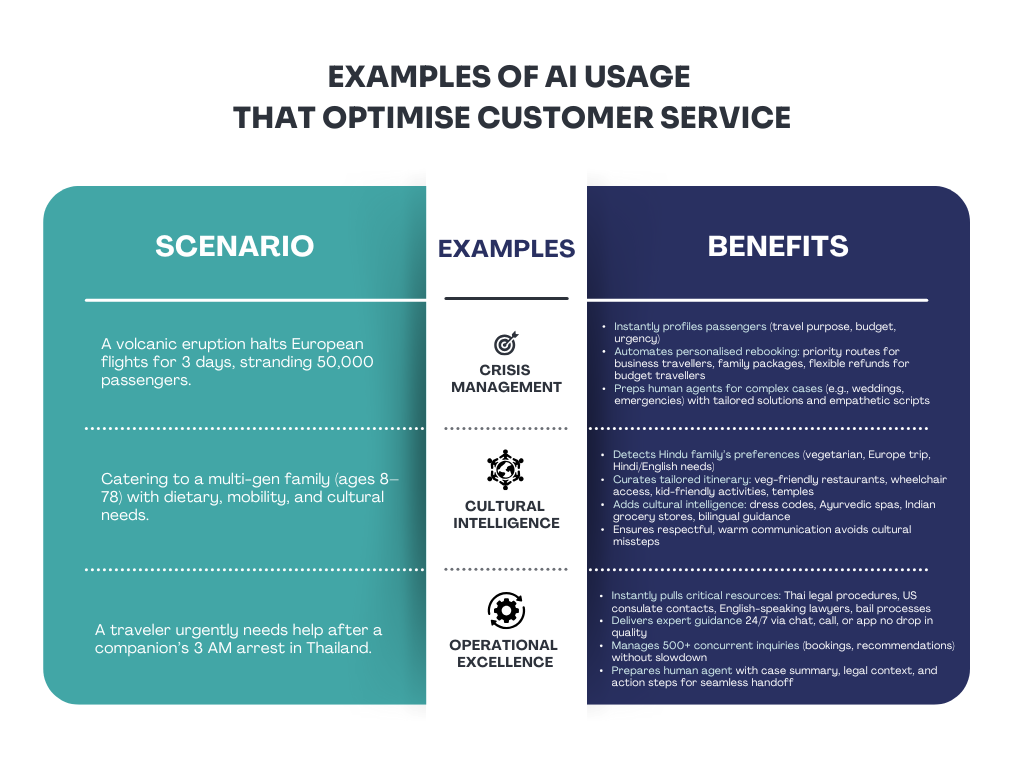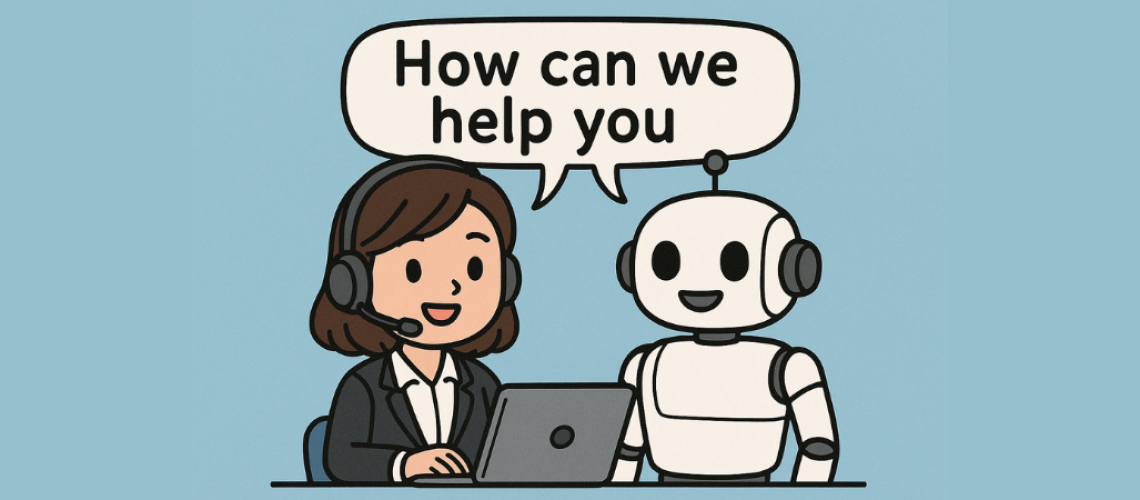The tourism industry has long prided itself on personal service, authentic connections, and the irreplaceable human element that transforms ordinary trips into extraordinary experiences, making AI in tourism seem like a contradiction. Yet as digital transformation accelerates, a critical question emerges: can artificial intelligence coexist with or even enhance the human touch that defines exceptional tourism service?
This article explores how AI isn’t positioned to replace human interaction in tourism, but rather to amplify human capabilities, eliminate operational bottlenecks, and ultimately deliver the personalised, empathetic service that customers expect. We’ll examine where human touch excels, identify its limitations, and reveal how AI can bridge these gaps to create a more efficient and emotionally intelligent customer experience.
The Enduring Power of Human Touch in Tourism
Tourism thrives on human connection for compelling reasons that technology alone cannot replicate. Human agents excel at complex problem-solving capabilities, particularly crucial in an industry where travel plans can be intricate and costly. Unlike automated systems, humans understand nuanced situations, consider multiple variables, and provide creative solutions for unique travel challenges.
The emotional connection and empathy that human agents provide cannot be understated. Tourism is inherently emotional. People are planning special experiences, vacations, and life memories. Human agents offer the empathy and understanding needed when things go wrong or when customers have anxiety about their travel plans. This emotional intelligence extends to personalized service and expertise, where human agents can offer recommendations based on individual preferences, past experiences, and specific needs that automated systems struggle to replicate authentically.
Trust and assurance form another cornerstone of human interaction in tourism. The nuances, empathy, understanding, and assurance of human communication provide a layer of comfort that’s especially valuable when travel involves significant financial investments and personal safety considerations. Human agents demonstrate flexibility and adaptability, adjusting their communication style to different customer types and handling unexpected situations with solutions that fall outside standard procedures.
Perhaps most importantly, human interaction drives long-term relationship building. Personalised, thoughtful customer service fosters loyalty, encourages repeat business, and generates positive word-of-mouth. In tourism, where customers often become repeat visitors or recommend services to others, the human touch helps build lasting relationships that drive business growth.
Where Human Touch is Recognised but Fails
Despite these strengths, human-centric tourism service faces significant limitations that impact customer satisfaction and operational efficiency. Speed and efficiency limitations create bottlenecks when human agents struggle with high-volume, repetitive tasks that automated systems excel at. Processing basic bookings, handling routine inquiries, and managing simple cancellations can create delays that frustrate customers expecting immediate responses.
The 24/7 availability constraints present another critical challenge. Human-dependent services cannot provide round-the-clock support without significant cost increases, yet tourism operates across time zones where customers often need immediate assistance outside business hours. This limitation becomes particularly problematic during emergencies or urgent rebooking situations.
Consistency and accuracy issues plague human-only systems. Managing bookings, handling cancellations, and providing support can be resource-intensive and prone to errors when relying solely on human processes. Human agents may provide inconsistent information, make calculation errors, or have varying levels of product knowledge, leading to service quality disparities that damage customer trust.
Emotional overwhelm and stress affect human agents when dealing with highly emotional situations or aggressive customers, potentially leading to burnout and poor service delivery. Language and cultural barriers further complicate service delivery, as human agents may lack the cultural knowledge needed for diverse international clientele.
Scalability limitations become apparent during peak seasons or crisis situations when human-only systems cannot scale quickly enough to handle surges in customer service demands. The cost and resource intensity of human-centric services can make tourism prohibitively expensive, particularly for budget-conscious travellers who may prefer self-service options.
How AI Fills the Gap Between Human Touch and Human Failure
AI emerges as the strategic solution to optimise human performance rather than replace it. Through advanced personalisation and hyper-targeting, AI can make smart recommendations based on user tastes and provide hyper-personalisation that increases tourism bookings by up to 25%. Unlike human agents who may forget customer preferences or lack access to comprehensive data, AI can instantly analyse vast amounts of customer data to deliver personalised experiences that feel human-crafted but operate at machine scale and consistency.
The optimal approach involves hybrid AI-human models that leverage AI to handle routine tasks, provide instant information, and detect when human intervention is needed, while preserving the human touch for complex emotional situations. This creates 24/7 availability with human-like interaction, where emotionally intelligent AI chatbots enhance customer service, making interactions feel more personalised and empathetic while solving availability constraints.
The 24/7 availability constraints present another critical challenge. Human-dependent services cannot provide round-the-clock support without significant cost increases, yet tourism operates across time zones where customers often need immediate assistance outside business hours. This limitation becomes particularly problematic during emergencies or urgent rebooking situations.
Consistency and accuracy issues plague human-only systems. Managing bookings, handling cancellations, and providing support can be resource-intensive and prone to errors when relying solely on human processes. Human agents may provide inconsistent information, make calculation errors, or have varying levels of product knowledge, leading to service quality disparities that damage customer trust.
Emotional overwhelm and stress affect human agents when dealing with highly emotional situations or aggressive customers, potentially leading to burnout and poor service delivery. Language and cultural barriers further complicate service delivery, as human agents may lack the cultural knowledge needed for diverse international clientele.
Scalability limitations become apparent during peak seasons or crisis situations when human-only systems cannot scale quickly enough to handle surges in customer service demands. The cost and resource intensity of human-centric services can make tourism prohibitively expensive, particularly for budget-conscious travellers who may prefer self-service options.
AI provides enhanced information processing and accuracy, anticipating and meeting traveler needs through advanced algorithms and machine learning. AI systems can instantly cross-reference flights, hotels, weather, and preferences to provide optimal recommendations without the calculation errors or knowledge gaps that human agents might have.
Scalable complex problem-solving becomes possible as AI handles complex, multi-step travel planning that would overwhelm human agents during peak periods, while maintaining the personalised approach customers expect. Proactive service delivery allows AI to anticipate customer needs based on booking patterns, weather forecasts, and travel disruptions, providing proactive support that human agents might miss due to workload or oversight.
The optimal approach involves hybrid AI-human models that leverage AI to handle routine tasks, provide instant information, and detect when human intervention is needed, while preserving the human touch for complex emotional situations. This creates 24/7 availability with human-like interaction, where emotionally intelligent AI chatbots enhance customer service, making interactions feel more personalised and empathetic while solving availability constraints.
The 24/7 availability constraints present another critical challenge. Human-dependent services cannot provide round-the-clock support without significant cost increases, yet tourism operates across time zones where customers often need immediate assistance outside business hours. This limitation becomes particularly problematic during emergencies or urgent rebooking situations.
Consistency and accuracy issues plague human-only systems. Managing bookings, handling cancellations, and providing support can be resource-intensive and prone to errors when relying solely on human processes. Human agents may provide inconsistent information, make calculation errors, or have varying levels of product knowledge, leading to service quality disparities that damage customer trust.
Emotional overwhelm and stress affect human agents when dealing with highly emotional situations or aggressive customers, potentially leading to burnout and poor service delivery. Language and cultural barriers further complicate service delivery, as human agents may lack the cultural knowledge needed for diverse international clientele.
Scalability limitations become apparent during peak seasons or crisis situations when human-only systems cannot scale quickly enough to handle surges in customer service demands. The cost and resource intensity of human-centric services can make tourism prohibitively expensive, particularly for budget-conscious travellers who may prefer self-service options.
Examples of AI in Tourism Which Optimises Customer Service

The strategic balance lies in AI handling areas where human touch fails—speed, consistency, availability, scalability while seamlessly escalating to human agents for situations requiring genuine empathy, complex problem-solving, or nuanced cultural understanding. This hybrid approach allows tourism companies to meet customer expectations for both efficiency and personal connection, using AI to eliminate gaps in human performance while preserving human interaction where it adds the most value.
AI doesn’t replace the human touch in tourism, it amplifies it, creating space for humans to focus on what they do best: building meaningful connections and solving complex problems that require genuine empathy and creativity.
